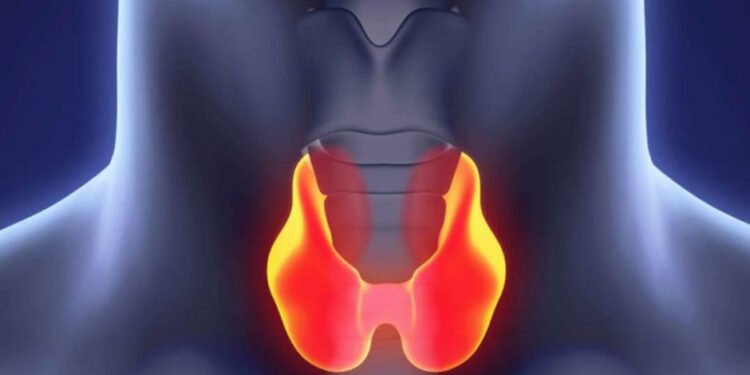The thyroid gland provides essential regulation to multiple body activities through its control of metabolism and energy levels, and brain function.
The mental condition deteriorates when thyroid hormones either become hyperactive (hyperthyroidism) or hyposecretive (hypothyroidism).
The combination of anxiety with depression and mood instability, and cognitive fog represents some major psychological symptoms linked to thyroid disorders.
Thyroid Hormone Therapy brings back hormonal equilibrium, which results in significant healing for emotional health alongside improved mental focus. Everyone interested in obtaining complete mental health support needs to understand these relationships.
Recognizing Mental Health Symptoms Due To Thyroid Imbalance
Thyroid imbalances are frequently diagnosed separately from mental health conditions since they manifest psychological symptoms in patients.
Underactive thyroid behavior known as hypothyroidism results in symptoms including ongoing weariness together with despair and problems focusing attention and depression manifestations.
Such emotional sluggishness or emotional numbness in people often leads to psychiatric evaluations to measure thyroid function because their symptoms resemble clinical depression.
The condition of hyperthyroidism leads to increased anxiety symptoms along with irritability and restlessness that can contribute to problems with sleep.
A person with hyperthyroidism can develop both panic attacks and mood changes, which produce seemingly disconnected emotional reactions.
A diagnosis becomes complicated since thyroid dysfunction may coincide with mental health disorders when physical symptoms demonstrate minimal or unperceived changes in weight or heart rate, and body temperature.
Thyroid function analysis needs to be connected to emotional health awareness to achieve correct medical assessment, along with successful treatment results.
Impact of Thyroid Hormone Therapy on Mental Health
Here is the impact of thyroid hormone therapy on mental health.
Improved mood stability following thyroid hormone regulation
Treatment with thyroid hormone medications improves mood stability when treating hypothyroidism with synthetic T4 (levothyroxine).
Many people show unpredictable emotional patterns before starting treatment since their periods alternate between feeling sad and apathetic before turning irritated. Therapeutic hormone level normalization usually reduces the unsteady emotions commonly experienced by patients.
Medicinal hormone therapy provides patients with restored emotional stability. When patients experience restoration of energy alongside better stress management capabilities, they start feeling genuine to their natural selves.
The improved body performance creates optimal conditions for emotional control because the brain receives necessary support through this improved functioning.
Mood stability requires proper dosing at regular intervals. Proper treatment of thyroid hormone requires regular testing, which detects when patients receive either too much or too little medication because improper dosing can delay emotional progress.
Therapeutic interventions allow most patients to achieve a significant reduction of their mood swings, along with restoring their emotional stability.
Reduction in depression symptoms with optimized thyroid levels
The main advantage of using thyroid hormone therapy involves its ability to lessen depressive symptoms among patients. Standard antidepressants show restricted effectiveness for depression linked to hypothyroidism until proper treatment of the thyroid condition.
Thyroid hormone correction leads patients to experience strong improvements in their mood patterns, together with restored motivation and emotional sensitivity.
Research indicates that specific depression patients who do not respond well to treatment become more responsive to thyroid hormone treatments regardless of their thyroid levels being in the normal range.
The evidence indicates that mental health benefits from thyroid function operating at its best level rather than an average level.
The brain achieves mood regulation through serotonin and dopamine control because a healthy thyroid promotes correct neurotransmitter activity.
Decreased anxiety is linked to balanced thyroid function
Hyperthyroidism produces anxiety symptoms while also creating anxiety as a resulting problem. The nervous system becomes excessively stimulated when thyroids operate beyond their normal levels, which produces these anxiety symptoms that include being highly alert with a fast heart rate and trembling body, together with intrusive thoughts.
People who remain unidentified about their thyroid problems might receive improper treatment instead of proper medical care.
Following the initiation of thyroid hormone therapy through antithyroid medications or radioactive iodine treatment, or surgery, the symptoms of anxiety usually start to decrease.
The stabilization of hormone levels enables the nervous system to calm itself, along with the reduction of anxiety-related physical symptoms, which include rapid heart racing, along with sleep problems.
Tragic patients who experience anxiety because of their symptoms of fatigue and mental sluggishness can still benefit from therapy.
Enhanced cognitive clarity and focus after treatment
The presence of cognitive problems represents one of the most irritating complications linked to thyroid dysfunction. When patients experience brain fog, they suffer from memory issues in combination with thinking slowness and reduced mental concentration abilities.
The symptoms block work performance and damage relationships while creating problems in making everyday choices, thus producing extra emotional turmoil.
Thyroid hormone treatment successfully provides relief to the cognitive symptoms patients experience. The majority of patients who achieve hormone balance in their therapeutic ranges discover enhanced mental clarity.
Hormone level stabilization creates clearer thinking, followed by the restoration of focus and a natural ability to solve problems easily. The improved mental clarity because of treatment strongly helps both personal welfare and professional efficiency.
Most people need between weeks and months before experiencing cognitive improvements, yet those adjustments lead to substantial mental changes.
The initial mentally challenging assignments now appear doable, and numerous patients observe that their cognitive skills and recall skills reappear.
Better emotional resilience through hormonal balance
The ability to successfully adapt and then recover from stressful situations tends to decrease in patients whose thyroid hormones remain imbalanced.
People with unbalanced thyroid hormones experience minor problems as major difficulties, while their ability to overcome emotional challenges diminishes. The brain struggles to control emotions properly because of its biochemical imbalance, which exists as no flaw of character.
The treatment of thyroid hormone levels leads to emotional resilience and recovery. People enhance their ability to deal with normal stressors and the adjustments occurring in their lives.
Such patients display higher capacities for handling any challenge with clear logic and long-lasting patience instead of yielding to minor emotional disruptions.
Relaxed emotional resilience spreads out to impact the way people connect with others and the way they work and develop as individuals.
Balanced hormones between the body and brain create emotional responses that become controlled and reasonable in their reactions. Thyroid hormone therapy leads to emotional well-being over time.
Final Thoughts
Using thyroid hormone medications brings medical benefits that extend to create significant improvements for mental alongside emotional well-being.
The benefits associated with thyroid hormone therapy include lifted depression symptoms, together with reduced anxiety and enhanced mental functioning, which results in extensive effects on mental health.












